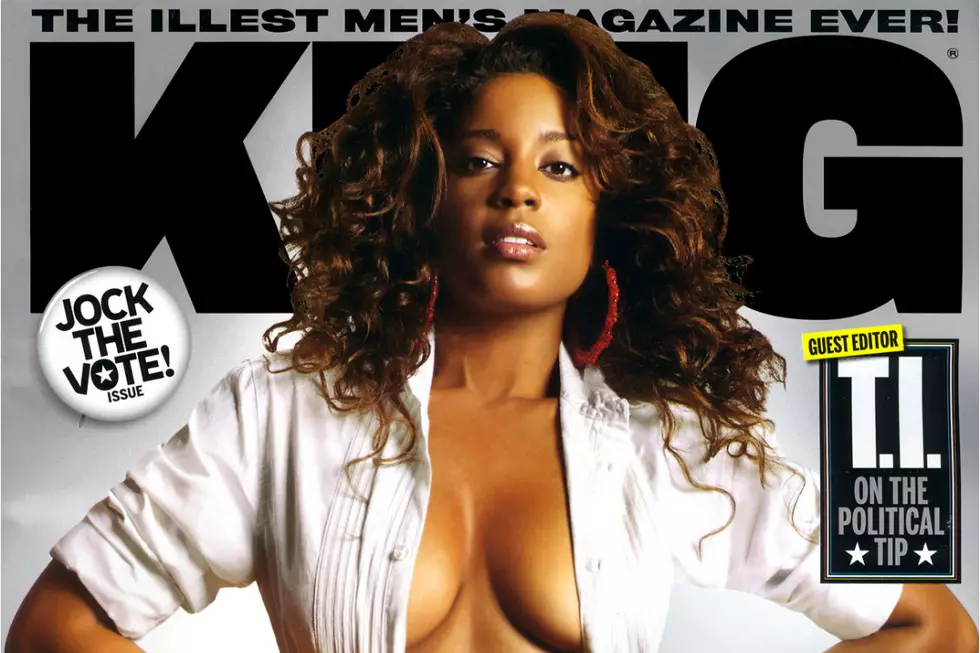The B.I.G. Playback
 Even after his death, Christopher "The Notorious B.I.G.†Wallace hypnotizes. Ten years after he was murdered in a drive-by shooting on Los Angeles' Wilshire Boulevard, Brooklyn's finest remains more intriguing than hip-hop's living, breathing heavyweights. Remember, the few icons around today—namely Diddy and Jay-Z—were merely Biggie's supporting cast. Yet limiting a celebration of his 24-year-long existence to musical terms would trivialize it. To those closest to him, he was a life-changing catalyst, a loved one whose death stings just as acutely now as it did a decade ago. Contrary to his own beliefs, Biggie was somebody before some nobody killed him.
Even after his death, Christopher "The Notorious B.I.G.†Wallace hypnotizes. Ten years after he was murdered in a drive-by shooting on Los Angeles' Wilshire Boulevard, Brooklyn's finest remains more intriguing than hip-hop's living, breathing heavyweights. Remember, the few icons around today—namely Diddy and Jay-Z—were merely Biggie's supporting cast. Yet limiting a celebration of his 24-year-long existence to musical terms would trivialize it. To those closest to him, he was a life-changing catalyst, a loved one whose death stings just as acutely now as it did a decade ago. Contrary to his own beliefs, Biggie was somebody before some nobody killed him.
WHAT'S BEEF?
Keith Clinkscales, former president of VIBE, revisits the magazine's controversial, "East vs. West†cover line
VIBE really [emerged] as a top publication because of our coverage of the East Coast-West Coast drama. In the beginning, I really didn't want VIBE to cover that kind of stuff. I wouldn't even want a writer to [write] about Snoop smoking weed during an interview, and I didn't want to see guns in photo shoots. Celebrating violence and using excessive profanity were not encouraged. But as we expanded into non-music coverage, exploring the depths of the community, the magazine was really put on the map with the way we were able to investigate the cause and effect of the so-called beef. Even The Source, which had been called "The Bible of Hip-Hop,†was behind us in terms of cultural relevance and importance. During this time VIBE was the magazine that the mainstream media often turned to and cited in their reporting on issues related to hip-hop.
It really hurts me when I hear people say that they feel like VIBE was responsible for Big's death because of the way we covered the stories. When there's a war, you report about it. It doesn't make the reporter responsible for the violence. We had a journalistic responsibility to the readers, the fans whose lives were shaped by the power of hip-hop.
While all the drama was going on between Big and Tupac, I was trying to put together a VIBE television show. Puff was pissed off at the magazine for some previous coverage, and we really needed to get his perspective on all the stuff Tupac had been saying. So I called him up and told him we wanted to do an interview. He said he didn't want to talk about the East Coast-West Coast stuff. I told him to just handle the questions however he wanted to handle them. And so we get a young writer, Larry "The Blackspot†Hester, to do the interview. Then we get these pictures taken that become iconic—you see that cover everywhere any time they talk about Big. As the magazine was on its way to closing, the story was good, the pictures were good and the only thing that remained was the cover.
We got the interview from Puff by giving an assurance we would not talk about East Coast-West Coast stuff. So I asked the editors not to place that on the cover, and then I was off to L.A. Over the next few hours the editors debated among themselves about the cover lines. According to the recap, there were two camps, one for the East Coast-West Coast line and those who were dead set against it. After much arguing, the cover line was selected, and an editor from the losing side was said to have said, "there will be blood on our hands.â€
I was disappointed the line was on the cover, but I stand by the editors...they were doing what they honestly felt was best for our readers. The hardest lesson for me was balance. Sometimes you can be a great journalist but a poor black man. Other times you can shape your coverage to be true to the race but not quite align with the tenets
of good journalism. This quest for balance is what awaits a black journalist for his or her entire career.
—As told to Aliya S. King
SOLEMNLY SWEAR
Digging up the truth, KING dispels three Notorious B.I.G. myths
MYTH:Biggie was preparing to follow-up Life After Death with a triple album to expedite his departure from Bad Boy.
TRUTH: "It was just talk. His thing wasn't trying to get out of Bad Boy. ‘Let me wrap my albums up and bounce on [Puff],' Big wouldn't have done that. Big was a loyal dude; back then, he and Puff had a relationship no matter what, beyond business. He could have taken Junior M.A.F.I.A. to Puff, and he would've signed us on the strength, but he wanted to get his own thing established, do for us like Puff was doing for him. He was
still gonna show loyalty to Puff, though.†—Lil' Cease
MYTH: Biggie formed the Commission, a super group headed by Jay-Z and himself.
TRUTH:"I don't know about the legal aspect of the Commission. It was Big's baby, though. It would have been me, [Big] and Jay front-running, but it would include Puff, Cease [and Lance "Un†Rivera]. I know initially no one was going to see my face. I was to be in a mask, mysterious but sexy. We never got to record anything.†—Charli Baltimore
MYTH After Tupac released "Hit 'Em Up,†Biggie recorded several response records.
RUTH "We [didn't] do diss records. He had some ammo ready for [Tupac], but we'd sit down and talk, like, ‘OK, we're no paper gangstas. We know what's gonna happen if we bump heads.' Just think—if Big would have been on records talking about what he would do to him when he see him, when that tragedy happened to Pac, we would have been the first suspects.†—Damien "D-Roc†Butler
For more of KING's tribute to the Notorious B.I.G., pick up the May '07 issue of KING Magazine. On newsstands now!
More From King








